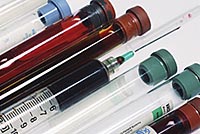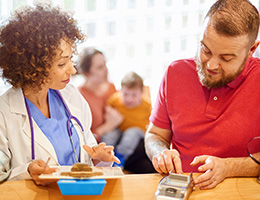We’re Stronger Together
With your help, we can make ambitious innovations in clinical care and education for our community.
Do you have diabetes? Or know a friend or family member who has been diagnosed? The Diabetes Treatment Center offers a free support group with important educational information and ongoing support. Join us for our monthly diabetes support group, led by experienced clinicians
Each meeting includes a diabetic friendly recipe by a registered dietician, FREE Support Group and discussions with diabetes specialists open to the public on the first Thursday of every month from 4:30pm to 5:30pm.
Glucose monitoring with up-to-date technology to fine tune insulin dosing and improve blood glucose.
Patient Education Booklet - English
Patient Education Booklet - Spanish
Blood sugar changes every 5-10 minutes. The only way to know blood sugar numbers is to test. Food, medications, exercise, and stress all affect the blood sugar. Some of the symptoms of high blood sugar and low blood sugar are the same. Please see the table below for the target blood sugar recommendations that vary by organization.
|
Organization |
Before meals |
Two hours after meals |
|
American Association of Clinical Endocrinologists |
110 mg/dL or less |
140 mg/dL or less |
|
American Diabetes Association |
90-130 mg/dL |
180 mg/dL or less |
The Diabetes Treatment Center recommends the following for our patients:
Before meals 80-120 mg/dL
Two hours after meals 100-140 mg/dL
We base these target ranges on the findings of numerous research studies that show the benefits of good blood sugar control.

Low blood sugar is also known as hypoglycemia or insulin reaction. This may happen when there is too much insulin in the blood or too little glucose (sugar). Low blood sugar is brought on by:
Persons with diabetes can become very ill and even go into a coma if their blood sugar is too high. High blood sugar is bought on by:
The Diabetes Treatment Center actively conducts research to develop more effective techniques to understand, treat, and prevent diabetes.
From time to time, patients may be asked to be a part of a specific research study. Participation is voluntary and subjects are provided with absolute anonymity. Their decision of whether or not to participate or terminate at any time will not affect present or future medical care.
If you are interested in volunteering for a study, please contact the Diabetes Treatment Center at (909) 558-3022.

Communicate with your provider, schedule appointments and check-in before you arrive using our patient portal. Accessing Loma Linda University Health has never been easier.

Learn more about billing, insurance and financial assistance programs available.

Our support groups are designed to support your wholeness of mind, body and spirit. Find a support group right for you and your family.
With your help, we can make ambitious innovations in clinical care and education for our community.